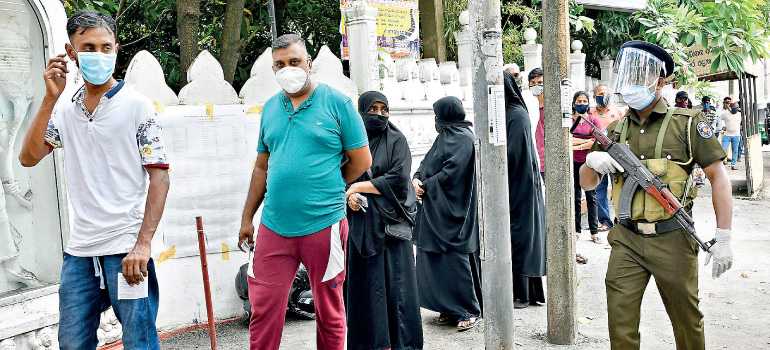Tuesday Mar 03, 2026
Tuesday Mar 03, 2026
Wednesday, 26 August 2020 00:00 - - {{hitsCtrl.values.hits}}

Ever since the proportional representation system together with the preference vote became part of the electoral landscape, one has witnessed a gradual deterioration of the political culture with voters being pushed into an individual centric rather than a policy centred approach – Pic by Shehan Gunasekara
My attention was drawn to a couple of recent write-ups by an erudite columnist to the press, promoting the Westminster ‘First-Past-the Post (FPP) system’ over the Proportional Representation (PR) system. Thus, it is evident that the two systems still remain to be properly understood by all concerned citizens and politicians. Also, at a time when the new Govt. is poised to give priority to the much awaited ‘Electoral Reforms’, it would be pertinent to educate them through a succinct comparison of the captioned systems by adopting an ‘Agree/Critique’ approach to the following notable excerpts from his first write-up.
Excerpt-1
1) “It is vital that political formations and individual candidates, who offer themselves to the voters, make public, well before the elections, their vision and plans to address such problems. These have to be debated and discussed by the voters and other political parties in the run up to the elections. Only then will the voters be able to take an informed decision.”
Agree with Excerpt 1 above.
Excerpt-2
1) Ever since the proportional representation system together with the preference vote became part of the electoral landscape, one has witnessed a gradual deterioration of the political culture with voters being pushed into an individual centric rather than a policy centred approach
Critique-1
1) The original Proportional Representation (PR) system (1978) had the ‘District Party candidate list in merit order’ as an integral adjunct. It was the optional and destructive ‘Preference Voting’ (PV) system (1981) which replaced the original merit list (1978), that became responsible for the deterioration of the political culture pushing the voters to be individual centric without first heeding to the policy manifestos of contesting parties. It was done under the pretext of giving a non-compulsory option to the voter to select his preferred candidate from a mere alphabetical list posed to him by the party concerned.
As a result, in the course of time, the voters elected sentenced murderers, vandalisers of the sacred Parliament, drug lords, sand miners, fraudsters, bribe takers, village thugs, actors/actresses, sportsmen and communalists, etc. ignoring party manifestos and side lining even hardworking, experienced and genuine politicians like Sunil Handuneththi. (This unfortunate result could have been avoided, if the JVP continued with their previous practice of naming their candidates from a central pool.
However, thanks to the existing PR system (though still unrefined), the recent election brought some ‘numerical sanity’ to the Parliament avoiding a complete ‘white wash’ mockery that would have occurred if the ‘First-Past-the Post’ system was in operation. During the recent election campaign, a senior Ex-Minister went on record that if the ‘First Past the Post’ system was implemented, their party will easily win all the electorates meaning that nearly 95% of mps would come from a single party. A somewhat similar result was chalked in the parliamentary elections in 1970 and 1977. What kind of democracy can prevail in such a situation?
The glaring, fundamental defect of the Electorate based ‘First-Past-the Post’ system is that it gives value only to the votes cast in favour of a single winner. All other votes are discarded and get ‘zero’ value although their sum total may exceed the total votes obtained by the winner in an electorate.
The PR system was basically introduced in 1978 to rectify that blatant anomaly. Moreover, the need for electing national level parliamentarians for each electorate became redundant with the strengthening of the ‘Decentralized Political Administration System’ through the Provincial Councils (PCs) armed with nine Provincial Parliaments in 1987. Unfortunately, the effectiveness of the PCs was paralysed by the MPs who jealously guarded their ‘Preference Vote’ bank in the electorates/districts, by blocking adequate powers and recognition to the PCs.
The ‘First Past the Post’ system in fact is individualistic and promotes voting based on Religion, Race and caste rather than on policies and action programme which are common to the Party and not specific to individuals.
The alien ‘Mixed voting’ system that was tested with the last Local Govt. Elections had its own share of problems and complexities ultimately leading to the indefinite postponement of the PC elections.
Excerpt-3
“One of the main arguments that have been adduced in favour of the principle of proportional representation is that it reflects the proportion of votes cast in favour of the different political parties more accurately than the first past the post system. While this is true, it does not take into consideration other drawbacks such as the increase in corruption as a result of the PR and Manape based electoral system as well as its divisive nature which perpetuates divisions along religious, ethnic and caste lines.”
Critque-2
As stated in Critique-1, it is solely the ‘Manape’ (PV) system that destroyed the very objectives of the robust and democratic PR system which in its original form was supported by District lists of candidates arranged in ‘Merit order’ by the relevant parties avoiding divisive lines. Under the ‘Merit order’ system, the voter is required to mark only one ‘X’ against the relevant party symbol based primarily on the five-year Election Manifesto and secondarily on the ‘merit based’ Candidate list.
Excerpt-4
“Taking into account all the pluses and minuses of the different electoral systems, the national interest is probably best served by reverting to the First Past the Post system. The mathematical distortion in the number of votes cast in favour of a party and the number of representatives elected from that party can be minimised to a great extent by carving the electoral boundaries in a manner to better reflect the voting pattern. The benefit to the country by doing so will be immense. The level of corruption will be reduced because a candidate will only require the resources necessary to campaign within the limited area of an electorate unlike in the PR system where he will have to spend to reach voters in the whole electoral district.”
Critique-3
A casual jump in to the conclusion favouring ‘First past the Post’ system without a robust comparison of the major pluses and minuses of the PR and ‘First past the Post’ system is unacceptable. The pivotal reasons given under Critique-1 amply justify the PR system over the ‘First past the Post’ system.
Also, the proposal to minimise the so-called ‘mathematical distortion’ by carving electorate boundaries to reflect the voting pattern is not so simple. As we know, any delimitation exercise is very complex and problematic attracting continuous dissention by the different communities due to constantly changing demographic data. The present district boundaries have been more or less accepted by the people.
Under the ‘Merit order’ system, since the candidates are already ranked by the Party hierarchy, the entire campaign expenditure can be handled by the Party head office, making it easier for the Elections Dept. to ascertain and monitor their financing campaigns quite effectively.
Excerpt-5
“Another important feature of the first past the post system is, it will greatly promote nation building through national unity. The current PR system is extremely divisive and encourages the voter to vote on the basis of religion, race or caste rather than the national good. Under the first past the post system voters will be encouraged to vote for a candidate based on his or her policies rather than his religion, race or caste. This will greatly strengthen relations between the communities at the grass roots level.”
Critique-4
How can a universally accepted PR system be extremely divisive, when all nationwide votes are considered as of equal value promoting ‘Sri Lankan’ identity bereft of religion, race or caste considerations? On the contrary, it is the ‘first past the post’ system that encourages the voters on the said narrow, divisive lines at grass root electorate level. Also, at a National election, the candidates have to support the main Election Manifesto of their party rather than their personal policies.
Excerpt-6
“Coming back to the need to make the parliamentary election campaign a platform to create a national conversation on policy issues, one gets the impression that most political parties fight shy of taking the voter into confidence with regard to their plans.”
Agree with the Excerpt-6 above
Excerpt-7
“For this the voters must take full responsibility and fulfil their responsibility to themselves and their society, by casting their vote to the political party and candidate of their choice after objectively examining the merits and demerits of the party and individuals concerned.”
Critique-5
The choice of Political Party should be primarily based on the ‘Election Manifesto’ (which has to be a prosecutable document) and secondarily on the candidates selected under robust criteria and structured interviews.
Further comments
All the above issues plus a few others have been factored in to my recent article that appeared in the press enumerating 13 measures that need to be included in the ‘Electoral Reforms’ that the ‘Yahapalana’ Govt. failed to legislate despite an All Party Constitutional Assembly sitting on it for 4½ years. The principal measures are given below for easy reference.
1) Abolition of the optional preference voting system which alone shall make the electoral system simple, meaningful, cost-effective and non-destructive.
2) The application of proportional arithmetic to allocate 30 cabinet portfolios will remove political rivalry and foster Sri Lankan identity and national unity under a ‘Permanent National Govt.’.
3) The advent of ‘Genuine Political Professionals’ with a high degree of ‘Common sense’ (consisting mainly of Lawyers, Accountants, Economists and socio-political experts who are best positioned to discharge the objectives and functions of a National Parliament) selected under a robust set of eligibility criteria and structured interviews will enable the Legislature to think and act ‘Country first’ setting aside petty political rivalries and sending the terms such as ‘Unstable Govt.’ ‘Hung Parliament’ and ‘2/3rd majority in to oblivion.
4) The conversion of the ‘Irreversible’ Provincial Councils to a productive Decentralized Political Administration system with more powers (if necessary) and specific role responsibilities under the guidance and monitoring by the President through Provincial Governors will ensure a balanced regional development of the country basically in terms of the ‘5 year Election/Policy Manifesto’ and the annual National/Decentralised budgets.
5) De-politicisation of the Local Govt. Machinery will ensure a fair and unbiased flow of assistance to local residents sans bribery and corruption and
6) Making the ‘Executive President’ a Non-partisan ‘Statesman’ enabling him to cater to all citizens equally. The zenith of a clean ‘Executive Presidency’ can be reached by a contest among independent candidates subject to a robust set of eligibility criteria.
Conclusion
In our view, for the foregoing to materialise, our civil society organisations like ‘Paffrel’, Caffe and CMEV should take the cue and convince the National Elections Commission to set the pace for the appointment of a ‘Civilian Task Force for Electoral Reforms’ comprising eminent retired judges and representatives of the aforesaid Civil Society Organisations bereft of politicians who are only ‘Agents’ of the People who will have to operate within a framework of governance designed by the People as the ‘Principals’ in keeping with the ‘Law of Agency’.
The writer is a retired banker.